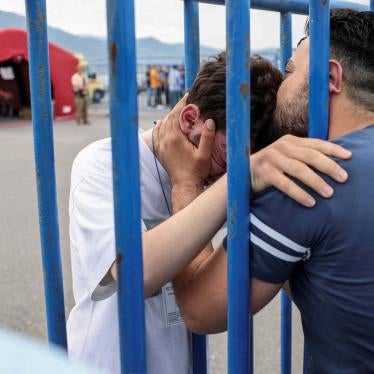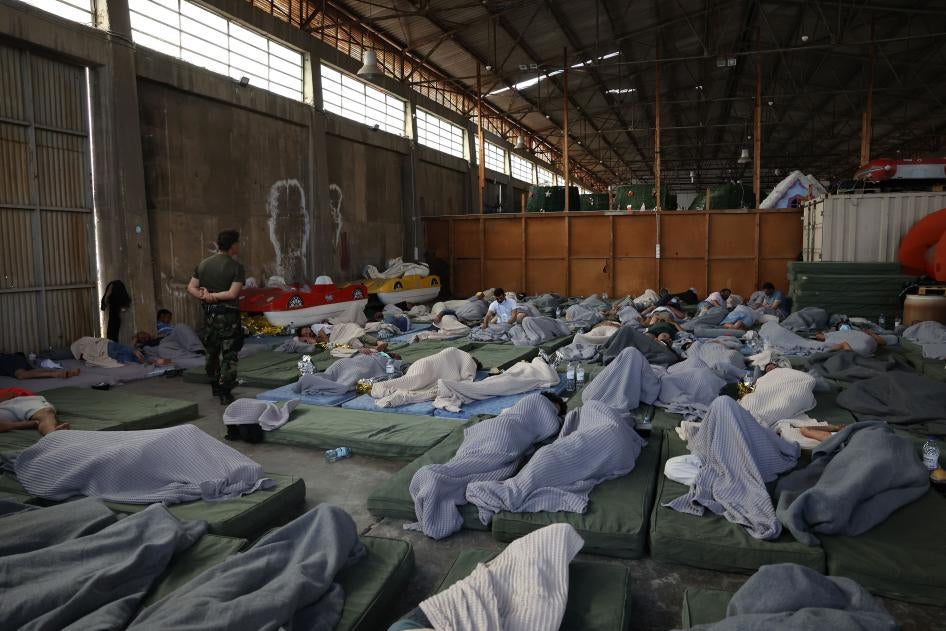Hamza and Hassan left their hometown in Pakistan in May. Over the next month, they flew to Dubai, then Egypt, and arrived in Libya. Smugglers had promised them that they would fly to Europe legally and convinced them to pay around US$10,000 for the trip. However, once in Libya, smugglers took away their passports and violently forced them aboard a fishing trawler, dangerously crammed with more than 700 people as it set off to cross the Mediterranean.
The boat capsized and sank off Pylos, Greece, on June 14. Hamza and Hassan are 2 of only 104 people known to have survived one of the deadliest shipwrecks the world has witnessed in years. Greek authorities, who knew the boat was in trouble, were quick to deny responsibility, claiming that passengers on the boat refused their assistance, and that the shipwreck resulted from a loss of balance caused by passengers’ movements. But in the aftermath of the tragedy, survivors’ testimonies paint a very different story.
Amnesty International and Human Rights Watch investigated the human rights concerns arising from the shipwreck and the Greek authorities’ response to it, visiting Greece a few weeks after the incident. While we were there, survivors consistently told us how, during the journey, they pleaded for rescue at different times, with different means and to different people. According to many survivors, a Greek Coast Guard ship attached a rope to the fishing trawler and pulled it, ultimately causing it to capsize. Survivors’ testimonies, in line with numerous media investigations into the shipwreck, raised many questions and concerns on the timing and execution of the subsequent rescue operation.
I met Hamza and Hassan, as well as other survivors, in a refugee camp near Athens, Greece, where they were waiting for their asylum requests to be processed. They told me the difficult story of their journey to Europe, every dangerous step. And as they were speaking, the reality of Europe’s deadly migration policies in the Mediterranean came into sharper focus.
--
Hamza, 24, and Hassan, 21, have been good friends for years. Because of political issues in Pakistan, they decided to leave the country together in search of a safer life. Hamza shows me pictures of an Italian football jacket on a phone. “I wanted to go to Italy: this is where my uncle is. He sent me this jacket and I promised to wear it there when I arrive. Now, it is lost in the sea.”
On their phones, they showed me photos and videos of the men they met during their journey, explained how they became friends, talked about their families and the dreams they had. Most of the people they traveled with were lost in the sea when the boat capsized and sank.
By some estimates, there were more than 300 people from Pakistan on the boat. The bodies of only 82 of the over 600 passengers lost at sea have been recovered to date, and only 58 have been identified. Of them, only 15 are from Pakistan. The rest are still deep in the Mediterranean Sea. Families of the missing are desperately seeking information about their loved ones.
Hamza and Hassan spoke fondly of the people they met on the boat, including Tariq, whose “two brothers living in France bought him a car as a surprise, for when he would arrive. But he sank into the sea. The brothers are trying their best to find where the body is now, but they are struggling.”
When recalling the events that led them to board the fishing trawler, they both look frustrated and angry. They spent thousands of euros, putting themselves or their families in debt, only to be held captive by smugglers in Libya: the “worst place,” according to Hamza and Hassan. “They took us to a terrible space to live, a warehouse ;the dog there had food, not the humans. We were forced to drink water from the toilet to survive.”
The United Nations has called Libya’s well-documented brutality against migrants crimes against humanity.
After a few weeks in Libya, the day to start the journey to Europe finally arrived. When the two friends saw the boat and the number of people on it, they did not want to board. “When we reached there, the ship was full, already overloaded. We disagreed to sit there;– we said ‘it’s not safe, this is too loaded. This is illegal.’” They described how the smugglers used a leather belt to beat them, threatening to throw them in the sea if they did not board.
On the boat, their journey went from bad to worse. People could bring very few things with them, they had little drinking water on the boat, and even that ran out in the first few days. Some drank salt water to survive. “From the start, everyone was sick because there was a horrible fish smell. But more than that, the atmosphere was very weird and tense.” On the fourth day, things started to escalate. “The situation got worse. People got sicker, some were trying to commit suicide, attempting to get out of the boat,” Hassan said.
After a few days, several people had died on board, they said. Other survivors have given similar testimonies.
Hamza and Hassan were not sure when people started calling authorities for help, but they insisted that everyone on the boat was asking to be rescued.
Our research shows that Greek authorities knew about the dire conditions on the boat for hours before it sank, yet they didn’t organize a timely rescue. It's not just a moral failing: Greece has a duty under EU and international law to respond to boats in distress and must prioritize the protection of life at sea over migration control. Hamza, Hassan, and the other survivors I met want to understand why no one came to their rescue before the boat sank. When I asked about the moments before the sinking, they got quiet.
Their silence is filled with the anxiety of more than 700 people waiting for help.
The two young men also want to know the truth about what caused the shipwreck. At around 2 a.m. on June 14, the fishing boat capsized off the Greek coast. Because of where they were on the boat, Hamza and Hassan couldn't see what happened, so they talked about how it felt. Hamza described a “weird, strong pulling" sensation and said it felt like the boat was moving forward as it flipped over. “Somebody pulled the boat,” they both said. This is another point where survivors’ stories differ from that of the Greek authorities. While survivors consistently told Amnesty International and Human Rights Watch that the coast guard attached a rope to their boat and started towing, causing it to sway and then capsize, the coast guard denies this, stating instead that a patrol boat used a rope to approach the trawler at an earlier time to assess the situation, but that people on the boat threw the rope back and continued their journey.
Six months later, there are still many questions about what happened.
Where people sat on the boat determined whether they were going to survive. Hamza said the smugglers told him where to sit and how: he took a curled-up position, his arms around his legs. “We were outside the whole time. Not inside. This is what saved me.” The other men he knew from Pakistan were crammed into the lower hold. “Most of them knew how to swim, because they are from the countryside in Pakistan where we have nice rivers [but] they couldn’t get out and save themselves.”
As investigations continue into one of the worst shipwrecks in recent history, the voices of Hamza, Hassan and the other survivors’ must be a vital component of any effective and credible reconstruction of the events. Together with Amnesty International and other independent observers, Human Rights Watch is calling for a full and credible investigation into the shipwreck to clarify responsibility for both the sinking of the boat and any delays or shortcomings in the rescue efforts. Such an investigation should include the testimonies of all survivors, under conditions that merit their trust and guarantee their safety.
Their voices are a key part of the story. It is time more people heard them.
If we listen carefully to what they have to say, the impact of EU’s deadly migration policies is hard to ignore. The persistence and normalization of illegal, violent pushbacks at sea and land, perpetrated with impunity by Greece and other EU border states, sends a clear signal about the priorities of European migration policies: exclusion and deterrence even if the cost is death. The scarcity of legal pathways for many people to migrate to Europe leaves them with little choice but to attempt the journey dangerously. As thousands die every year – most drowning in the Mediterranean – because of such policies, and as migration policies grow increasingly hostile, the trauma experienced by survivors like Hamza, Hassan and the others will likely remain unaddressed: “None of us can sleep now. We all have nightmares of the ship sinking, when we close our eyes, this is what we see, our friends that we made during the trip, and we see them drown, in front of us. There is no one to talk to about this in the camp.”
Hamza and Hassan think they survived because of their prayers and the lucky charms they wear around their necks. They tell me that now, most of their prayers are about finally getting their legal documents to live in the EU “so we can start another life. Now that we survived, they should give us a chance to have an actual life here,” says Hamza, who still wants to meet up with his uncle in Italy.
They also want truth and justice. “We both want to know what happened, we want justice. This is our main concern,” Hassan said.
They want answers about what happened. And they want to understand how Greece and Europe can continue letting people die like this. Frankly, we do too.




